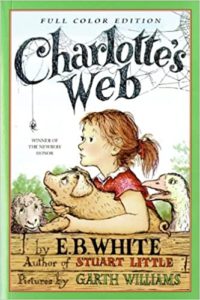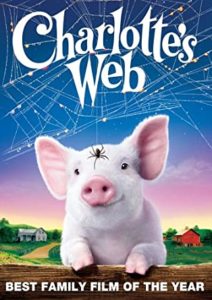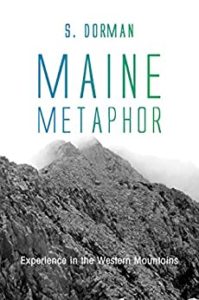
Monday the state permitted those “from-away” to hunt along with Mainers. Opening season for Mainers began Saturday, awfully spooking the deer who don’t know Halloween except in this form. Awful thing to do to them during the rut when they’d rather concentrate on something better and are so crazed. Or, maybe not crazed but more alive and concentrated than at other times? Especially, I’m guessing, the males who also fight with one another over does and territory. The hills above our house, front and back, are as alive—with gunfire. I know their lying down places but I’m not saying where.
E.B. White, essayist and long-time resident of Maine, died from Alzheimer’s disease, leaving behind a worthy public legacy in the form of essays, stories, and letters. While alive, he was at times smitten, as we all must be, by memento mori, Latin, “remember that you must die.” The English definitions are two: “a reminder of mortality,” and “a reminder of man’s failures or mistakes.” White wrote of it with depth and precision, giving his readers, both children and adults, comfort and encouragement, which is what we need most in the face of it. Charlotte’s Web, his well-known children’s book, and his essay “Death of a Pig” are compassionate examples.
 Charlotte’s Web is about the pig Wilbur, runt of the litter, who is being raised in order to be slaughtered. Much as we are but for God’s salvation. When Wilbur first learns of this, learns that he’s being fed and cared for in order to be butchered for ham and bacon, he becomes quite frantic, running around screaming and crying. “I don’t want to die! Save me, somebody! Save me!”
Charlotte’s Web is about the pig Wilbur, runt of the litter, who is being raised in order to be slaughtered. Much as we are but for God’s salvation. When Wilbur first learns of this, learns that he’s being fed and cared for in order to be butchered for ham and bacon, he becomes quite frantic, running around screaming and crying. “I don’t want to die! Save me, somebody! Save me!”
This response is quite normal and appropriate, and one reason why we aren’t all constantly running around screaming and crying about the eventuality of death is that—we forget: especially when things run smoothly, the way we invariably want things to run. In 1914 E.B. White was raising a pig—in order to be slaughtered, like many Mainers still do. When his pig first became sick he put off the search for castor oil because, he came to realize, he didn’t want to “officially recognize the collapse of the performance of raising a pig.” Failure in an important enterprise, or failure in body or mind such as we experience in illness, make us remember. Remembrance bestows meaning.
Charlotte’s Web was White’s artistic response to the patient suffering and death of this pig by illness. What hysterical little Wilbur needs in his moment of panic is reassurance, and this comes in the form of his new friend, Charlotte the gray spider, who had spun her web in the doorframe of the barn above Wilbur’s head. Charlotte promises to think of a way to save Wilbur from the farmer’s chopping block. This wonderful promise calms Wilbur—for a while at least. He is able to enjoy life and the company of his new friend, but once in a while something happens to remind him afresh and terror again sweeps over him. We, too, when in the grip of memento mori would like to know not only that we will be saved, but how. E.B. White got involved in trying to save his sick pig’s life. He gave the pig its castor oil, administered an enema, and—very important—he identified with the pig. He allowed its discomfort and misery to affect him, possibly because of his position of responsibility for the pig’s well-being. As he said, the pig’s lot and his own were intertwined, bound, and, trying to save him from illness and misery, became an obsession. What we have here are two small beings—a spider and a writer—trying to save a pig or two from death.
 To convince the farmer that his pig Wilbur is no ordinary pig, a spider’s method is rather writerly. Charlotte does it by advertising the pig’s charms in her dew-spangled web. She spells it out for him. Wilbur the runt pig, it turns out, is “some pig.” (A thoroughgoing Maine compliment.) He’s also “terrific” and “radiant.” But, most importantly and endearingly, he’s “humble.” When Wilbur asks Charlotte—whose vocabulary is varied and extensive—what humble means, she gives him a dictionary definition: Humble has two meanings. It means “not proud” and “near the ground.” Because of the miracle of the web, and the attention it brings, Wilbur becomes special to the farmer, thus assuring that he will not be slaughtered. Here E.B. White, in this children’s story, is pointing out the endearing quality of humility. Charlotte has saved Wilbur by making him dear.
To convince the farmer that his pig Wilbur is no ordinary pig, a spider’s method is rather writerly. Charlotte does it by advertising the pig’s charms in her dew-spangled web. She spells it out for him. Wilbur the runt pig, it turns out, is “some pig.” (A thoroughgoing Maine compliment.) He’s also “terrific” and “radiant.” But, most importantly and endearingly, he’s “humble.” When Wilbur asks Charlotte—whose vocabulary is varied and extensive—what humble means, she gives him a dictionary definition: Humble has two meanings. It means “not proud” and “near the ground.” Because of the miracle of the web, and the attention it brings, Wilbur becomes special to the farmer, thus assuring that he will not be slaughtered. Here E.B. White, in this children’s story, is pointing out the endearing quality of humility. Charlotte has saved Wilbur by making him dear.
An anxious White called the vet to save his pig. The doctor’s conversation contained the possibility of erysipelas, a mysterious disease that could also infect humans. Far from reassuring, this had the effect of pouring terror into White’s already addled state. By the time he had hung up the phone, his imagination had convinced him that he had the pig’s disease. Some fearful few hours later the vet arrived, took the pig’s temperature, and announced that it did not have erysipelas. Later, White slept “with a feeling of relief” at “having turned over part of the responsibility of the case to a licensed doctor.”
Memento mori has a way of reminding us how vulnerable we are, how incapable we are of saving ourselves. It’s humbling. We did not make ourselves, we did not give ourselves breath, health, we cannot keep full life in our bodies when it is time for life to depart. White maybe thought we might remember that the ultimate care of ourselves is in the hands of another, of love. Have you ever been served, or yourself served, an indifferently prepared meal? If anything else were caring for us it would not be very good care. According to Essays of E.B. White, Harper & Row, 1977, White thought this and he believed that humility and love would help us through our fear of death.
There should be some Latin words that say, “remember that I am loved.” Words that remind of the good things that nurture us: the sun, vegetation, rain, education, work, friends, parents, children, animals. If any of these things aren’t present now, the words remind of a time when they were: Google translates: ego memini me diligetur. “I remember I shall be loved.”
E.B. White lovingly records the last day of his pig’s life—an account of watchful, attentive concern. The pig seems to find comfort in bobbing his snout in a bucketful of water; he lacks the strength to make a furrow in which to lie in the sawdust; he leaves the pig house to die.
In bed that night, White grieved for the pig. Earlier in the essay he says his pig’s suffering embodied all earthly misery. This dying pig, then, was the being that taught White something about love, once he allowed himself to receive a dose of the pig’s suffering. It is this capacity for sensitive awareness and communal suffering that adds depth to a person. Not proud, low to the ground, E.B. White had such depth. Remember him.
*
S. Dorman has lived in Maine and studied its ways for decades, including through graduate work on Maine in the humanities. Based on journaling, Maine in Winter is forthcoming—fourth book in the series of MaineMetaphornarrative nonfiction—put out by Wipf & Stock. She blogs the metaphor here.



